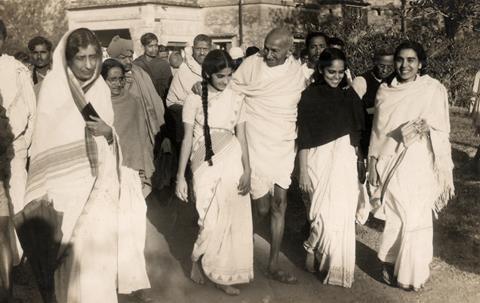Veteran documentarian Anand Patwardhan turns the camera on his own parents to reflect on India’s turbulent history

Dir: Anand Patwardhan. India. 2023. 96min
For decades, Anand Patwardhan has been the torchbearer of impassioned social and political non-fiction cinema in India; with The World Is Family, he approaches the political through the prism of the personal. The film is an intimate and affectionate snapshot of the director’s late parents, Wasudev Hari Patwardhan (aka Balu) and Nirmala Patwardhan. Through their remarkable journeys in life, he captures the history of the nation—the freedom struggle, the high of seizing independence and the subsequent horrors of Partition all the way down to the divisiveness and fundamentalism gaining ground in contemporary India.
A precious piece of oral history to hold on to
The film premiered in the Luminaries section of the Toronto International Film Festival and, in line with Patwardhan’s previous work including Bombay: Our City (1985), In the Name of God (1992), War And Peace (2002) and Jai Bhim Comrade (2011), will travel extensively at festivals both in India and abroad. At home, Patwardhan’s documentaries have almost always invited the ire of the rulers of the times. Though The World Is Family is his most accessible, emotionally sweeping and affecting film to date, the trenchant contemporary political critique underlying the personal nostalgia might come in the way of finding wider avenues of release in India.
There is lots to love, respect and admire about Patwardhan’s parents as we see their distinctive personalities emerge through his fond eye and doting camera. Cheerful Balu is in love with life, enthusiastic to cast his vote in elections at the age of 91. “I laugh enough in life not to practice laughing,” he comments in the opening sequence. His sense of humour runs like a thread through the film.
Outspoken Nirmala, meanwhile, has a sharp tongue, loves her cigarettes, claims to be privy to her son’s love affairs and the secrets of politicians of her times. A committed ceramist, she had sworn Balu not to die before her. He kept the promise. We see the couple bickering over something as inane as a pyjama, playing a game of cards and listening to soothing classical music of Kumar Gandharva. Both belonged to an era suffused in idealism and humanism, and have clearly inspired their son’s politics as well.
While Balu lived in the small town of Ahmednagar in Maharashtra, Nirmala grew up in Hyderabad, Sindh, now in Pakistan, went to Shantiniketan, the school founded by Nobel laureate Rabindranath Tagore, had many an encounter with Gandhi and lost a precious and carefully preserved gift—Gandhi’s hanky—while moving to India post Partition. She travelled the world in pursuit of her passion for pottery, often leaving Patwardhan behind with his father or at boarding school.
Balu’s two brothers were freedom fighters. Purushottam (aka Rau) was inspired by the nonviolent, pacifist activism of Mahatma Gandhi and spent time in jail, while Achyut, fired with a revolutionary zeal, was part of the underground movements. Of the entire family, Balu was the only one never to have been imprisoned, a fact that he himself jokingly points out. As Patwardhan puts it, post-independence Rau and Achyut turned away from politics and walked out of history.
The spine of the narrative are the forthright interviews conducted with Patwardhan’s parents over three decades. Ten years after their death—Nirmala passed away in 2008 and Balu in 2010—Anand saw a film in this footage together with other home videos: of birthdays, anniversaries, pottery firings, the trip to Pakistan on a people-to-people peace movement in 2003 and a long-awaited visit to Maitri, his mother’s ancestral home turned hospital. He weaves the footage seamlessly with candid conversations with family members, associates and friends, and incorporates old photographs and archival footage to bring the past alive.
That’s not just his family, but an entire generation of Indians who also believed in the values enshrined in India’s Constitution—liberty, equality, fraternity, secularism—and who questioned the divides imposed by caste, religion and gender. In fact, the film takes its title from the Sanskrit language phrase, Vasudhaiva Kutumbakam (“the world is one family”) that underscores the spirit of collectivism. The film is a call to hold on to this fast-disappearing spirit of solidarity, harmony and humanism. It also underscores the subcontinent’s shared socio-cultural links that transcend national boundaries.
The film is a treasure trove of memories, of Gandhi, Nehru, B.R. Ambedkar and an almost forgotten figure like Pakistani political leader Allah Baksh, who was against the Partition. The World Is Family is a precious piece of oral history to hold on to at a time when recorded history in India is itself under threat, being rewritten or erased. But more than anything else, it is about joie de vivre as well as a stoic acceptance of aging, illness and death. There is something pleasantly unadorned and unguarded about the expression of both happiness and loss and grief. Families are nurturing grounds for compelling stories; Balu and Nirmala’s is one for the ages. With his parents as the focal point, Patwardhan sees India’s present in the light of its past.
Contact: Anand Patwardhan anandpat@gmail.com
Producer: Anand Patwardhan
Cinematography: Anand Patwardhan, Simantini Dhuru
Sound: Anand Patwardhan, Simantini Dhuru
Editing: Anand Patwardhan
























